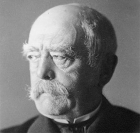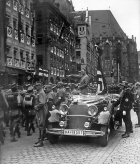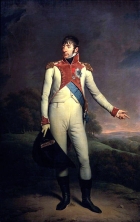Europe
From the fall of Napoleon to Revolution in Russia and from the rise of Hitler to the fall of the Berlin Wall this period is one of major upheaval in Europe. We see the collapse of monarchies and empires and the changing status of women and working men. This is a time that witnesses the mass displacement of peoples and genocide on a scale never seen before it is also a time that sees changes in medicine and technology that make fundamental changes to our everyday lives. Read more
Sort by:
Date (Newest first) | Title A-Z
Show:
All |
Articles |
Podcasts |
Multipage Articles
-

British Christians and European Integration
ArticleClick to view -

To what extent was the failure of denazification in Germany 1945-48 a result of the apathy of the allies?
ArticleClick to view -

Hungarian Nationalism in International Context
ArticleClick to view -

The Uses of History in the Twenty First Century
ArticleClick to view -

Bismarck
ArticleClick to view -

Opposition and Resistance in the GDR
ArticleClick to view -

Czech Uranium and Stalin's Bomb
ArticleClick to view -

Bombing and the Air War on the Italian Front 1915-1918
ArticleClick to view -

Louis, John, and William: the 'Dame Europa' pamphlets, 1870-1871
ArticleClick to view -

Britain and the Formation of NATO
ArticleClick to view -

Vichy France and the Jews
ArticleClick to view -

The Resistable Rise of Napoleon Bonaparte
ArticleClick to view -

The Military Historian and the Popular Image of the Western Front, 1914-1918
ArticleClick to view -

The 'Era of the Dictators' Reconsidered
ArticleClick to view -

The Migration of Indians to Guiana and Surinam
ArticleClick to view -

Napoleon III and the French Second Empire
ArticleClick to view -

Football and British-Soviet Relations
ArticleClick to view -

Minority rights and wrongs in Eastern Europe in the 20th century
ArticleClick to view -

Faster, Higher, Stronger: The Birth of the Modern Olympics
ArticleClick to view

